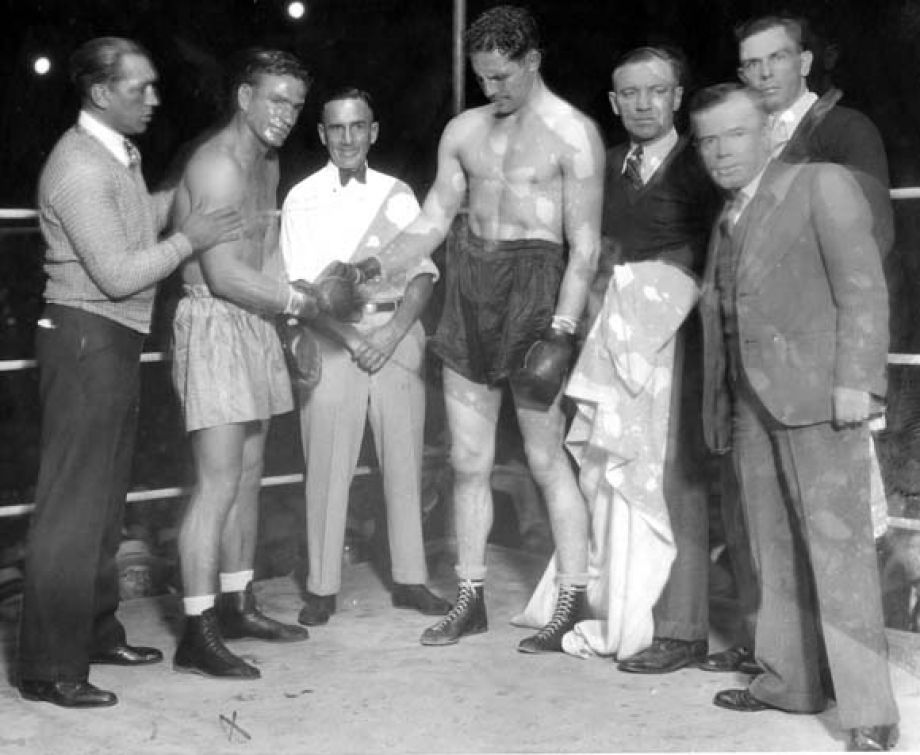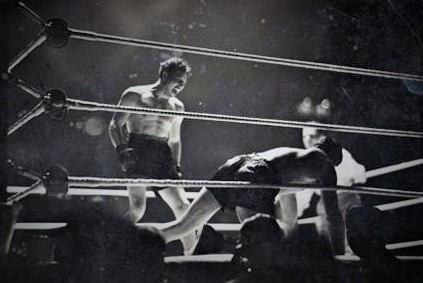At the end of the second, Frankie Campbell tells his corner, “Something feels like it broke in my head.”
He’d put future heavyweight champion Max Baer down in that round with a left to the ribs, though it was ruled a slip by referee Toby Irwin. Thinking Baer was taking a count, Campbell walked over to the ropes, turning his back on his opponent. Baer got to his feet, crossed the ring and landed a huge right to the side of Campbell’s head. Campbell stayed on his feet, but when he returned to his corner at the bell, he confided to his second, Tom “Greaseball” Maloney, that something wasn’t right.
The fight between Baer and Campbell took place outdoors, in a ring built over home plate at Recreation Park in San Francisco. The 21-year-old Baer, whose family had relocated to Northern California from Omaha, had gained recognition after knocking out Jack Linkhorn in front of a sellout crowd three months earlier.

Frankie Campbell (born Francisco Camilli) was from San Francisco’s Glen Park neighbourhood, and was chosen as a suitable match-up for the younger Baer because he was a crowd pleaser, very busy in the ring. Also, as the other major California heavyweight talent, he was the logical opponent for something billed as the “Pacific Coast championship.” Despite Campbell’s riding a 14 bout win streak, Baer was the favourite and this was to be his last local fight before his handlers started shopping him out to the east coast promoters.
Baer came into the fight weighing 194, Campbell only 179. At the weigh-in, the State Athletic Commissioner instructed both men to “keep fighting as long as the other man is on his feet.”
After weathering the surprise shot from behind in the second, Campbell regains his momentum in the third round and takes the fourth handily. But in the fifth Campbell catches a left hook to the jaw which hangs him up in the corner. Baer pushes forward, launching a series of vicious power shots. Campbell, held up by the ropes, stays on his feet and Baer, relentless, stays on the attack, landing punch after punch, bouncing Campbell’s skull off the metal turnbuckle. When the referee finally pulls Baer away, Campbell topples to the floor, unconscious.

Baer leaves the ring, showers, changes into street clothes. He asks if he can see Campbell in his dressing room, find out how he’s doing. He’s told Campbell is still in the ring, has been lying there almost a half an hour, waiting for an ambulance to arrive. The next morning, Baer receives a call from the hospital. Campbell is dying. Baer makes his way there and is greeted by Campbell’s wife. They stand together by her husband’s bedside and she comforts the distraught Baer, saying “It could have been you.” She forgives him.
Frankie Campbell died at 11:35 am, of a double cerebral hemorrhage, the result of the blows received during the bout. Baer was taken into custody by Police Captain Fred Lemmon and charged with manslaughter, his bail set for $10 000. The charges were later dismissed, yet Max Baer, referee Toby Irwin, and the managers and seconds of both fighters were suspended for a year by the state athletic commission.

The death of Frankie Campbell traumatized Max Baer. He was a different fighter afterward, a different man. He lost much of his aggressiveness in the ring and became more of a showman, an entertainer. He took up smoking, and began having nightmares. Though Baer went on to take the heavyweight championship from Primo Carnera four years later, the events of August 25, 1930 obviously remained forever fresh in his mind.
“Nothing that ever happened to me—nothing that can happen to me—affected me like the death of Frankie Campbell,” he said, shortly after the fight with Carnera. “It was almost a week after the fight before I could get more than an hour or so of successive sleep. Every slightest detail would come racing back to mind, and I couldn’t blot from my eyes the last scene—Frankie unconscious in the ring, his handlers working on him. And then the news that he was dying … dead.” — David Como
The post Aug. 25, 1930: Baer vs Campbell appeared first on The Fight City.

